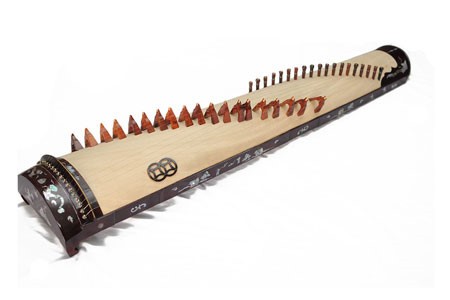Hello and welcome to VOV’s Letter Box, our weekly feature dedicated to our listeners throughout the world. We are Mai Phuong and Phuong Khanh.
A: This week was a great week for us because we received a lot of letters and emails from our listeners around the world.
B: I was very excited to receive the postal letters because they reminded me of the past when there was no internet, no emails and we could only contact our faraway friends by phone or letter.
A; I think the way we write a letter is different from the way we write an email. And the feeling we get when we open a letter is very inspiring and exciting.
B: You’re right. This week, I was especially impressed by a letter from Mark Fridle. He typed a letter to us on June 12 and mailed it in a very typical old envelope and sealed it with a star.
A: Typed? It’s not easy to find a typewriter in today’s digital world. That’s really interesting.
B: In his letter, Mark wrote: “For the past week, your signal has been heard here in Waukesha, Wisconsin, USA. Your broadcast on 6175 khz, 49 meter band from 03:30 to 04:00 is having problems. SINPO is 33322. Your carrier is making it but your audio is not that well. There is some background noise but it is not too bad”.
A: Thank you, Mark Fridle, for your letter. We’ll send you a QSL card to confirm your reception report.
B: In a letter to VOV this week, Risto Happonen of Finland sent us a beautiful postcard of the City Hall of Kuopio, Finland and reported reception of VOV broadcasts on June 1 from 15:59 to 16:27 UTC on the frequency of 9730 khz with SINPO of 55545. Risto wrote: “I have received 2 QSL cards. Thank you very much. We are now in summer in Finland. We have midnight sun in summer. I hope you have a happy summer”.
A:This week, we received several letters from Fumito Hokamura of Japan. He listened to VOV broadcasts on May 23, June 4, June 9, and June 15 on the frequency of 12020 khz. All SINPOs were rated 45333. In his letters, Fumito said he loves Vietnamese music, especially Vietnamese folk music.

Vietnam's 16-string zither |
B: Vietnam is home to 54 ethnic groups, each with its own customs and traditions. Those groups have created a variety of traditional musical instruments, which have played an important role in Vietnamese people’s lives. The musical instruments of Vietnam include the "monochord zither", the "moon-shaped two-string lute", and the “pear-shaped lute with four strings”. One of the best-known musical instruments is the Đàn Tranh or 16-string Zither.
A: The Vietnamese 16-String Zither is considered the “Princess" of Vietnam's traditional plucked string instruments. Its beautiful sound beguiles everyone. The Zither can be played as a solo instrument or accompany by other instruments in Vietnam’s traditional orchestras - Tuong (a classical theater form), Cheo (popular theater), Cai Luong (reformed theater), Nha Nhac (court music orchestra), Chau Van (ceremonial singing), religious music, and Don Ca Tai Tu (southern amateur singing). The instrument sometimes accompanies poetry recitals.
B: When playing the 16-string Zither, Vietnamese musicians focus on the melody. The melody is inspired by the language of everyday conversations, echoing Vietnamese minds, hearts and spirits. The most difficult part of playing this instrument is reflecting the Vietnamese soul and culture in the music.

Dan Tranh artist Ha Phuong |
A: The 16-string zither is very difficult to learn, but anyone can try. With enough dedication, anyone can learn how to play the 16-string Zither, at any age. The ideal age for learning this instrument is between 9 and 15. At that age, students are more focused than they were at a younger age but have more time to practice than adults do.
B: In recent years, the Hanoi, Hue, and Ho Chi Minh Conservatories and other music education centers have organized many classes to teach the 16-string Zither. Those same conservatories and centers also hold performances and workshops in Vietnam and abroad to expand the audience for this kind of music.
A: That’s a brief introduction to Dan Tranh, the 16-string zither of Vietnam. Li Ming of China wrote: “Very glad to write to you. I’m a listener from Fujian, China. I’m interested in your VOV radio programs. This is a new reception report for VOV English programs. I hope you find my reception report of some use”.
B: Thank you, Li Ming, for your report. We’ll confirm it with a QSL card. 73-year-old Neelakandan of India listened to our broadcast on June 3rd from 01:00 to 01:28 UTC on the frequency of 12005 and rated SINPO at 35433. He wrote: “This service is primarily to North America, but audible here in India fairly well and I enjoy listening to your service which is informative about Vietnam and its relations with the world. Keep it up”.
A: Richard Lemke of Canada sent us several emails over the past week and reported listening to our broadcasts on June 16, 20, 21, 23 and 26 on the frequency of 12005. He reported that the signal was silent sometimes, the transmission broke away, and listening was difficult but on June 26, there was no gap in the program content. Everything ran smoothly.
B: Thank you, Richard, for your regular reports on our programs. We are happy to hear that you received our QSL cards with a picture of Hoai river in Hoi An though it took about 32 days to reach you. Thank you.
A: Richard Nowak of the US also reported some problems in our transmission this week. Listening to our broadcast on July 4, he wrote: “Just a quick note to say tonight’s show came in strong but the announcer’s voice went silent 30 times. A lot of information did not come through”.
B: Thank you for your report. We’ll forward it to our technicians. On today’s program, we’d like to acknowledge letters and emails from Toshiya Nishimura and Fumito Hokamura of Japan, Hannu Kiiski of Finland, Grog Benjamin of Switzerland, Paul Hayes of Ireland, Bhaikan Hazarika, Siddhartha Bhattacharjee, and Muralidhar M of India, Razzak Hossain of Bangladesh, Bonfanti Fabrizio of Italy, Edward Embry of the US, and Andy Martynyuk of Russia. We’ll send you all QSL cards to confirm your reports.
B: We welcome your feedback at: English section, Overseas Service, Radio Voice of Vietnam, 45 Ba Trieu Street, Hanoi, Vietnam. You can email us at: englishsection@vov.org.vn. You’re welcome to visit us online at www.vovworld.vn, where you can hear both live and recorded programs. Good bye until next time.